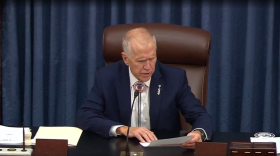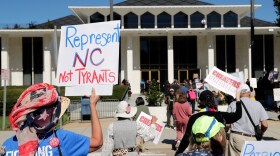A federal judge in Greensboro could clear the way for gay marriage in North Carolina, following the U.S. Supreme Court’s refusal on Monday to hear five pending same-sex marriage cases.
Middle District Court Judge William Osteen, who has the authority to order North Carolina to allow same-sex unions, said on Monday that he wanted to hear from both parties in a case challenging the state’s constitutional Amendment One, defining marriage as a union between a man and a woman.
Osteen issued his order after the Supreme Court declined reviewing appeals on same-sex marriage legislation in five states, including Virginia. A ruling from the U.S. Court of Appeals for the 4th District that struck down Virginia’s constitutional ban on such unions likely applies to North Carolina and four other states under that court’s jurisdiction.
Osteen said in his order that he wants to clarify the similarities between the Virginia case and the North Carolina case. Each party involved has 10 days to file.
Gay marriage advocates celebrated the Supreme Court’s decision and began preparing paperwork to overturn Amendment One, while state lawmakers said they would intervene in the case and defend the amendment, which was approved by 61 percent of voters in 2012.
“We represent clients who face severe medical challenges, so days and weeks matter to our clients,” said Chris Brook, an attorney with the American Civil Liberties Union, which is representing clients in two of four cases challenging restrictions on gay marriage. “Based on the Supreme Court, there should be no obstacles to them getting married in a matter of days.”
Attorney General Roy Cooper, who is largely expected seek the Democratic nomination for governor in 2016, has said he will not defend the amendment further. But Republican Gov. Pat McCrory expressed displeasure with the court’s decision, and Republican Senate Leader Phil Berger and House Speaker Thom Tillis said they would seek outside counsel to intercede.
“We will vigorously defend the values of our state and the will of more than 60 percent of North Carolina voters who made it clear that marriage is between one man and one woman,” Berger and Tillis said in a joint statement.









